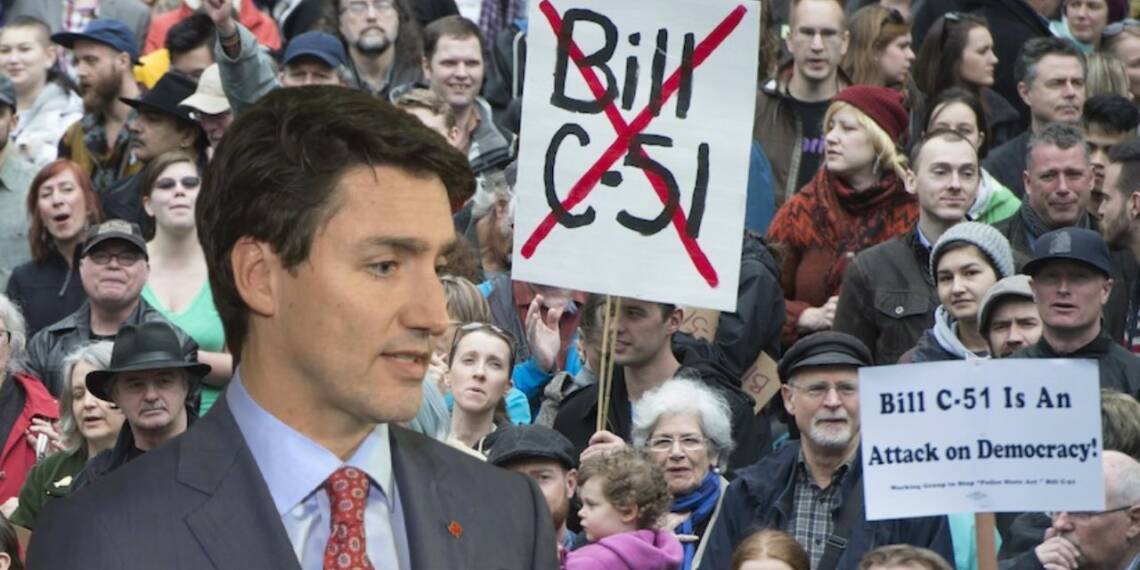Canada has experienced a significant shift in its approach to dealing with terrorism, and it’s safe to say that the credit for this transformation goes to none other than PM Justin Trudeau. While it might be hard to imagine Canada without the specter of terrorism looming, there was a time when the country took a different stance.
Under the leadership of Prime Minister Stephen Harper, Canada enacted strict anti-terrorism legislation known as Bill C-51. This legislation aimed to combat terrorism by criminalizing the “glorification” and “promotion” of terrorist activities. It granted the Canadian Security Intelligence Service (CSIS) more powers to disrupt potential terrorist plots, expanded detention powers, and introduced the criminalization of statements that advocated terrorism.
One of the most controversial aspects of Bill C-51 was the provision that criminalized the promotion of terrorism. It stated that individuals who knowingly advocated or promoted terrorism offenses could face imprisonment for up to five years. Furthermore, the legislation allowed judges to issue warrants for the seizure of “terrorist propaganda,” even without criminal charges, equating pro-terror materials to child pornography in legal terms.
Bill C-51: When Terrorism was a ‘Grave Sin’
Read More: Canada is officially Khalistan, India has shown it to the World
Bill C-51 also made “terror glorification” a condition of parole, imposing stricter conditions on offenders considered at risk of promoting terrorism. This legislation aimed to fill a gap in Canadian criminal law by making it illegal not only to incite terrorist acts but also to encourage them indirectly.
The controversy surrounding Bill C-51 was not unfounded, with civil libertarians and progressive groups criticizing it as an overreaction. They argued that it expanded CSIS powers, allowed the arrest of individuals based on suspicion of future criminal activity, and introduced a speech-related criminal offense related to terrorism.
Despite these concerns, Bill C-51 garnered significant support among the Canadian public at the time, with 72% in favor. The provisions regarding the “glorification of terrorism” were particularly popular, with 91% of respondents supporting measures to make the promotion of terrorism illegal.
However, when Justin Trudeau’s Liberal government came to power, one of its first acts was to address Bill C-51. The government pledged to amend the legislation and promptly removed the “glorification” provisions. While CSIS retained many of its expanded powers, the threshold for preventive detentions was raised, effectively reverting the law to its pre-C-51 state.
Fast forward to the present day, and Canada faces a new reality. The country has witnessed a surge in pro-terror rallies, especially in the wake of events like the attacks by Hamas. These rallies explicitly endorse acts of terrorism as “resistance” and call for the destruction of Israel.
Organizers of these rallies have been vocal in their support of Hamas fighters and have even targeted Jewish businesses and organizations. Chants at these rallies explicitly reject a “two-state solution” in favor of Israel’s total eradication.
One cannot help but wonder if maintaining the provisions of Bill C-51, especially those related to “glorification” and “promotion” of terrorism, could have provided a legal framework to address these challenges.
Read More: Jagmeet Singh’s Anti-India Stance has Destroyed Justin Trudeau’s Political Career
In the end, the transformation of Canada’s stance on terrorism from the days of Bill C-51 to the present raises questions about how the nation navigates the complex landscape of freedom of speech, security, and international conflicts. The role of leadership and the willingness to confront these issues head-on will undoubtedly continue to shape the country’s approach to terrorism in the years to come.
Watch More:
https://www.youtube.com/watch?v=NryaXJWeEVs&t=18s








